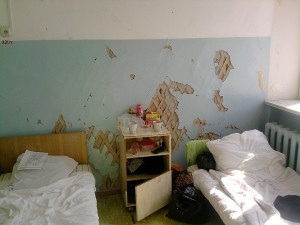
Russian healthcare, just like state-funded Soviet healthcare before it, has never been characterized by either quality or accessibility. Despite rather large investments in the medical industry that both the federal and local budgets could afford during the period of high energy prices, the quality of medical care received by the population remains appallingly poor. There is a deficit of doctors, and their level of knowledge does not meet modern-day standards. There is a continuous deficit of effective drugs. Today, when oil revenues have plunged and there is no prospect of foreign investment, the question arises: At whose expense will the government be cutting back on spending? The authorities have quickly found a solution on the federal level by gradually reducing healthcare spending for over a year. Local authorities act in a similar way. Only, whereas in Putin’s opinion, the government cannot cut down on “national security” spending (or in other words, federal expenditures on the police and special forces used to suppress popular unrest), local authorities use budget funds that were supposed to be spent on health care and education, for example, to build sports facilities for the upcoming 2018 FIFA World Cup instead. Thus, in St. Petersburg, funds originally intended for the construction of schools, daycare centers and healthcare facilities are going to be used to complete the construction of the Zenit Arena stadium.
Georgi Poltavchenko, Putin’s colleague from the Leningrad KGB and current governor of St. Petersburg, called this redistribution of funds a “technical solution” instead of admitting that the country that is rapidly sliding into poverty simply cannot afford an expensive World Cup. It would seem that it should not be difficult for
Read More “Stadiums Versus Hospitals”





